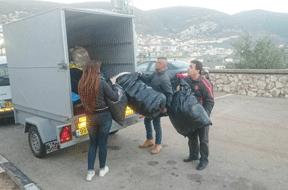
The issue of border security and whether or not it’s safe to welcome refugees is a hot topic in the United States. It’s something Israelis have been concerned about since before the birth of the Jewish State in 1948. Today, many Israelis are concerned about the plight of Syrian refugees.
The Jews have a long history in Syria. Our tradition tells us Jews were in Syria since the time of King David and certainly since early Roman times. Jews started settling in Syria after they were expelled from Spain in 1492 and quickly took a leading position in the Jewish community.
Most Syrian Jews immigrated to Israel following the War of Independence in 1948. One of these families was my grandfather’s family, which made Aliyah to Jerusalem from the city of Halab.
Since 1948, Israel has been in a state of war with Syria. The countries have fought three major wars — the Arab-Israeli War in 1948, the Six-Day War in 1967 and the Yom Kippur War in 1973. Efforts to make peace over the years have not been successful.
Today, Syria is facing a devastating civil war. That conflict grew out of the unrest from the 2011 Arab Spring and escalated to armed confrontation after Syrian President Bashar al-Assad’s government violently repressed the rebellion. The Syrian government has since refused efforts to negotiate with what it describes as terrorist groups. International organizations have accused the Syrian government, ISIL and rebel groups of horrendous human rights violations, including massacres.
Syria’s armed conflict has caused the worst worldwide refugee crisis since World War II. The violence in Syria has caused millions to flee their homes. In figures released in September 2016 by the United Nations High Commissioner for Refugees (UNHCR), 4.8 million have fled to Turkey, Lebanon, Jordan, Egypt and Iraq, and 6.6 million are internally displaced within Syria. Israeli news reports claim that nearly a half million citizens have died during the unrest.
Driven by their commitment to “never again,” Israelis have undertaken several initiatives to help the people on the other side of the border. While Israelis are not allowed to visit or enter Syria, there is a safe zone in southern Syria where Israelis, with the help of the IDF, can provide some humanitarian help. For example, more than 2,000 Syrians have been treated in Israeli hospitals since 2013. The State of Israel is also proceeding with plans to bring 100 orphaned Syrian refugees to Israel as permanent residents, integrating them into Arab-Israeli families. The children’s immediate relatives will be considered for refugee status as well.
There are other examples of how Israelis have helped Syrians. Amaliah — an Israeli organization whose mission is to support projects that create partnership, stability and prosperity with the Middle East and promote a safe zone in Southern Syria — provides food, medical aid, water and educational programs. A group of Israeli civilians known as Just Beyond our Borders provides much needed emergency aid to Syrian children. In yet another example, more than 30 Israeli chefs are coordinating efforts to cook Syrian dishes and will donate the proceeds to the Karam Foundation to help Syrian refugees.
As I stated earlier, most of the Israelis who support those initiatives are driven by the memory of the Holocaust. The same memory that lives in our hearts and makes us strong also makes us sensitive to the pain of others.
Shiran Cohen is the Jewish Federation of Greater Kansas City’s Israel emissary. The 28-year-old grew up in Kiryat Yam and proudly served three and half years in the IDF where she was a lieutenant in the Moran special artillery unit. She still serves as part of a reserve unit.